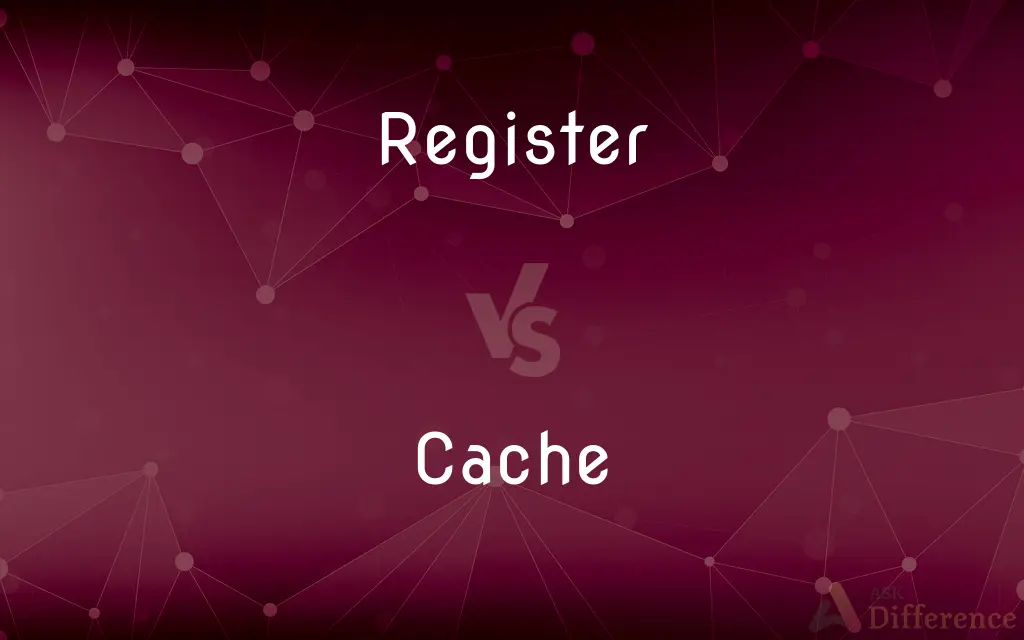Register vs. Cache — What's the Difference?
By Tayyaba Rehman — Published on January 22, 2024
Register means small, ultra-fast storage locations directly within the CPU for immediate data processing. The cache is a smaller, faster component that stores copies of frequently accessed data from the main memory.

Difference Between Register and Cache
Table of Contents
ADVERTISEMENT
Key Differences
Registers in a CPU are the smallest and fastest memory units, providing immediate data access for the processor's current operations. Cache, while also fast, is slightly larger and slower than registers, designed to store frequently used data for quick access.
The number of registers in a CPU is limited and varies depending on the architecture, typically ranging from a few dozen to a few hundred. Cache memory, in contrast, is more abundant, usually measured in megabytes, and is split into levels (L1, L2, L3) based on proximity to the CPU and speed.
Registers operate at the speed of the CPU, facilitating the fastest data access possible for immediate computation tasks. Cache memory, while faster than main RAM, bridges the gap between the ultra-fast speed of CPU registers and the slower main memory.
Registers are directly managed by the CPU's internal operations, with data stored for only as long as a particular operation requires it. Cache memory manages data semi-independently, using algorithms to predict and store information that the CPU will likely need next.
The role of registers is vital in the execution of instructions, as they store operands and intermediate results during computation. The cache primarily reduces data access time and the processing delay by holding copies of frequently accessed data from main memory.
ADVERTISEMENT
Comparison Chart
Storage Size
Very small, measured in bytes.
Larger, typically measured in megabytes.
Speed
Fastest, operates at CPU speed.
Faster than RAM, slower than registers.
Function
Holds data for immediate CPU operations.
Stores frequently accessed data for quick access.
Management
Directly managed by CPU.
Semi-independently managed with algorithms.
Location
Inside the CPU.
Between the CPU and main memory.
Compare with Definitions
Register
A small, fast storage location within the CPU.
The CPU register temporarily holds data during processing.
Cache
Stores copies of frequently accessed data.
Cache memory speeds up data retrieval for the processor.
Register
Stores data needed immediately by the CPU.
Registers are essential for quick CPU computations.
Cache
Organized into levels (L1, L2, L3) based on speed.
L1 cache is the fastest and closest to the CPU.
Register
Limited in number, directly managed by the CPU.
The CPU's architecture determines the number of registers.
Cache
A smaller, faster memory component near the CPU.
The CPU cache reduces the time to access frequently used data.
Register
Operates at the speed of the CPU.
Registers provide the fastest data access in a computer system.
Cache
Managed using algorithms to predict data needs.
Cache algorithms predict which data the CPU will need next.
Register
Holds operands and results of CPU operations.
Intermediate results of calculations are stored in registers.
Cache
(computing) A fast temporary storage where recently or frequently used information is stored to avoid having to reload it from a slower storage medium.
Register
A device that automatically records a quantity or number.
Cache
(computer science) RAM memory that is set aside as a specialized buffer storage that is continually updated; used to optimize data transfers between system elements with different characteristics
Register
(Computers) A part of the central processing unit used as a storage location.
Cache
Serves as a buffer between RAM and the CPU.
The cache acts as an intermediary storage for quick access.
Register
(computing) A small unit of very fast memory that is directly accessible to the central processing unit, and is mostly used to store inputs, outputs, or intermediate results of computations.
Common Curiosities
What is a register in a computer?
It's a small, extremely fast storage location within the CPU for immediate data processing.
Can cache size affect computer performance?
Yes, larger cache can improve performance by reducing the time needed to access frequently used data.
Are registers visible to the operating system?
No, they are managed internally by the CPU and not directly accessible by the operating system.
How is a register different from cache?
Registers are smaller and faster than cache, directly managed by the CPU for immediate operations.
What is cache memory?
Cache is a small, fast memory component that stores frequently accessed data to speed up access.
Why is cache memory important?
It reduces the need to access slower main memory, speeding up data retrieval and processing.
Can registers store data permanently?
No, registers hold data temporarily for immediate processing tasks.
What's the fastest type of cache?
L1 cache is the fastest, being closest to the CPU.
Is cache memory volatile?
Yes, like RAM, cache is volatile and loses its contents when the power is turned off.
How many registers does a typical CPU have?
It varies, but CPUs generally have dozens to a few hundred registers.
Do all CPUs have cache memory?
Modern CPUs typically include cache memory for efficiency.
Is more cache always better?
Generally, more cache can improve performance, but there are diminishing returns.
Do different CPU models have different cache architectures?
Yes, cache size and architecture can vary significantly between different CPU models.
Can a program control data in the registers?
The CPU controls register usage based on program instructions but not directly by the program.
How is data managed in cache?
Data in cache is managed through predictive algorithms to optimize speed and efficiency.
Share Your Discovery

Previous Comparison
CML vs. SML
Next Comparison
MMA vs. UFCAuthor Spotlight
Written by
Tayyaba RehmanTayyaba Rehman is a distinguished writer, currently serving as a primary contributor to askdifference.com. As a researcher in semantics and etymology, Tayyaba's passion for the complexity of languages and their distinctions has found a perfect home on the platform. Tayyaba delves into the intricacies of language, distinguishing between commonly confused words and phrases, thereby providing clarity for readers worldwide.















































